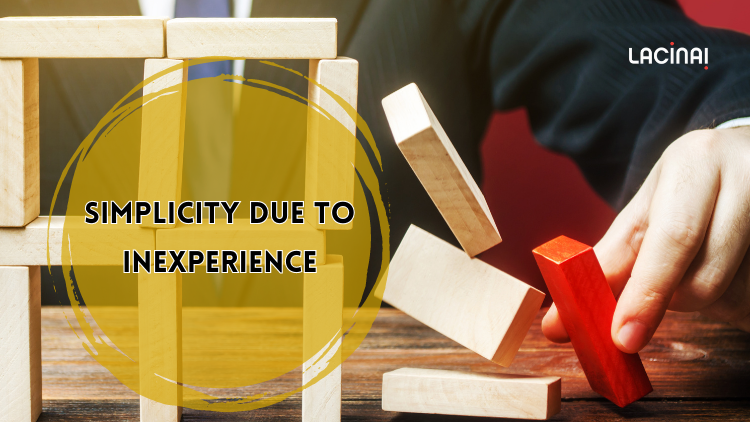By Antoni
1. SIMPLE due to inexperience
2. COMPLICATED due to experience (!)
3. SIMPLE again, but this time because you CARE
Most people stop at phase 2….
In Swedish: Det finns tre mognadsfaser inom kommunikation. De flesta når bara till steg 2. Därav de 1000 missförstånden som skapar lägre engagemang och mer frustration…
Ha en fin dag! Have a great day!
Team Antoni Explains
Effective communication is the bedrock of successful relationships, whether personal or professional. It enables us to convey our thoughts, needs, and emotions, fostering understanding and connection. However, becoming a competent communicator is a journey that involves navigating through three distinct phases of maturity.
In this blog post, we will explore these phases and provide valuable insights on progressing from simplicity due to inexperience to complexity driven by Experience and ultimately to simplicity with care.
Phase 1: Simplicity Due to Inexperience
At the onset of our communication journey, we find ourselves in Phase 1—simplicity due to inexperience. During this phase, communication tends to be essential and straightforward, often lacking nuance and depth. Individuals in this phase rely on limited vocabulary and struggle to grasp nonverbal cues, making it challenging to express complex ideas effectively.

Challenges and Limitations:
- Limited language skills may lead to misunderstandings and misinterpretations.
- Difficulty navigating difficult conversations or addressing sensitive topics.
- Limited effectiveness in professional settings where advanced communication skills are required.
Strategies for Growth:
To progress from Phase 1 to Phase 2, individuals can adopt the following methods:
- Engage in active listening and observe others’ communication styles to expand their own repertoire.
- Enrich their vocabulary and practice different language patterns to express ideas more clearly.
- Seek feedback and learn from mistakes to improve communication effectiveness.
Phase 2: Complexity Due to Experience
As we gain Experience and accumulate knowledge, we enter Phase 2—complexity due to Experience. At this stage, our communication becomes more intricate, marked by advanced vocabulary, subtle nonverbal cues, and the ability to engage in complex discussions and debates. However, excessive complexity can pose challenges and limitations.

Challenges and Limitations(Phase 2):
- Overly complex communication may result in misinterpretation and confusion.
- Adapting communication styles to different audiences becomes more difficult.
- Overwhelming others with excessive information or technical jargon.
Strategies for Growth (Phase 2):
To progress from Phase 2 to Phase 3, individuals can employ the following methods:
- Develop empathy and emotional intelligence to understand better and connect with others.
- Simplify complex ideas and concepts to ensure clarity and comprehension.
- Adapt their communication style to meet different individuals’ and contexts’ specific needs and preferences.
Phase 3: Simplicity with Care
The pinnacle of communication competence is Phase 3—simplicity with care. Here, clarity is achieved not due to inexperience but through a deep sense of caring for the audience.

In this phase, communication is characterized by plain language, active empathy, and the ability to adapt to diverse needs.
Benefits and Impact:
- Building trust and rapport by fostering an atmosphere of openness and understanding.
- Facilitating effective teamwork and collaboration through clear and inclusive communication.
- Bridging gaps and promoting understanding across diverse backgrounds and perspectives.
Strategies for Cultivating Care in Communication:
To master Phase 3 and cultivate care in communication, individuals can practice the following methods:
- Actively empathize with others and strive to understand their perspectives and emotions.
- Pay close attention to nonverbal cues and emotional signals, allowing for more meaningful connections.
- Tailor communication to suit individual preferences and needs, ensuring inclusivity and resonance.
Read More: Clarity In Your Communication Is Vital
Conclusion
Becoming a competent communicator is a transformative journey that involves progressing through three maturity phases. By recognizing the importance of simplicity, complexity, and simplicity with care, we can enhance our communication skills and cultivate more meaningful connections with others.
Continuous growth and development in communication competence will empower us to succeed in various aspects of our lives, fostering stronger relationships and enabling collaboration and understanding across diverse contexts and backgrounds. Embrace this journey, and watch your communication skills flourish.
Frequently Asked Question
Focus on active listening, expanding your vocabulary, and seeking feedback to enhance your communication abilities.
The three phases are simplicity due to inexperience, complexity due to experience, and clarity with care. Strategies include active empathy, simplifying complex ideas, and adapting communication to different contexts.
By gaining experience, expanding your language skills, and practicing different communication patterns, you can gradually transition from simple to more complex and nuanced communication.
It refers to advancing from basic communication skills to more sophisticated ones and finally reaching a stage where you communicate, yet effectively, with care for the audience.
Initially, communication starts simple due to inexperience, then becomes complex with increased knowledge and skills. Finally, it evolves into simplicity with care, where you use plain language and adapts your communication to meet others’ needs.
Improving communication skills can build trust, enhance teamwork and collaboration, and foster understanding across diverse backgrounds, leading to more substantial and more successful relationships both personally and professionally.



